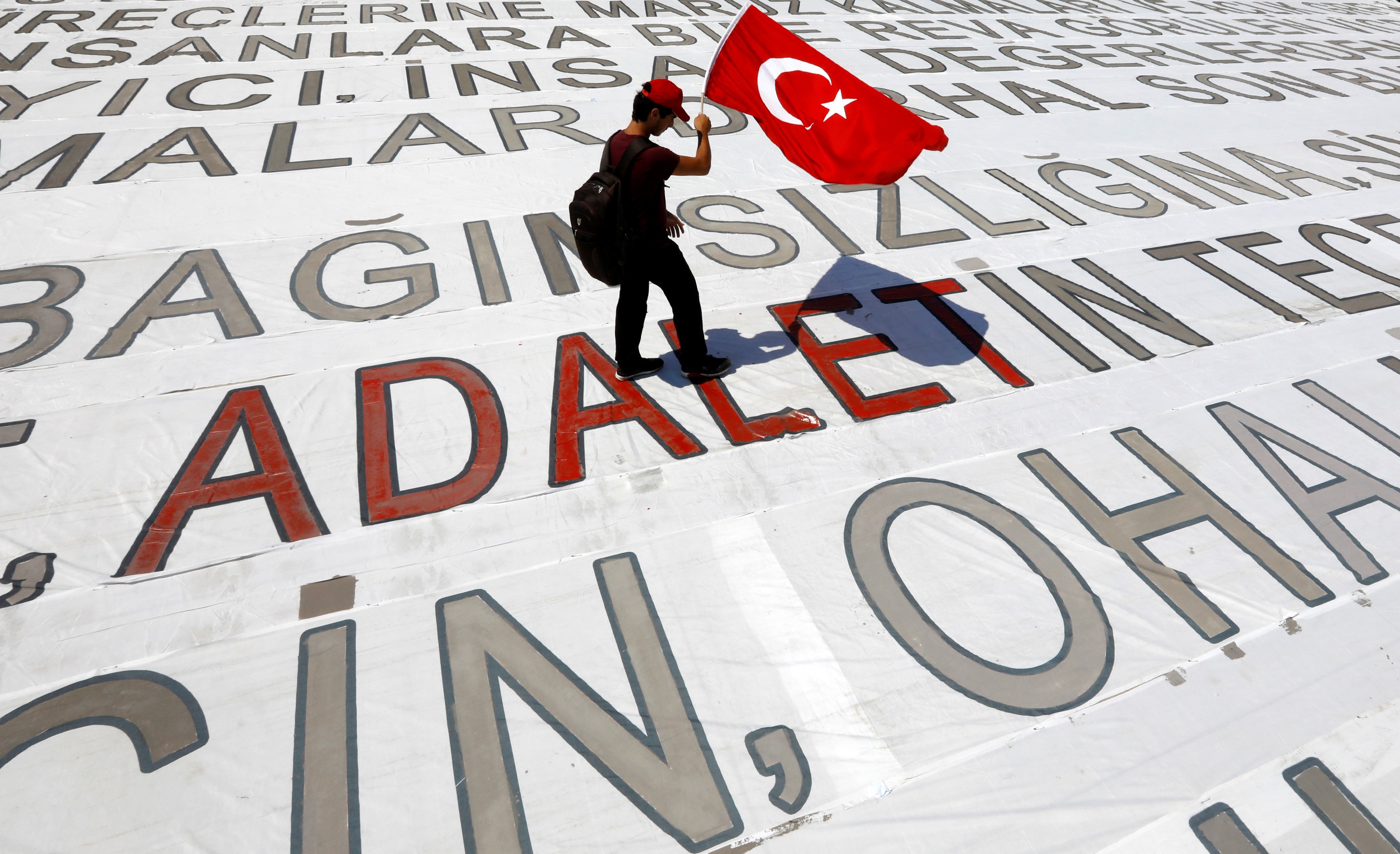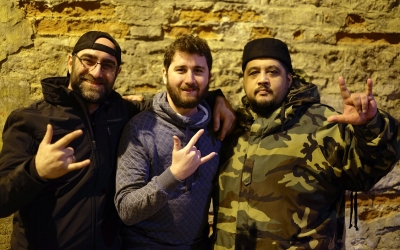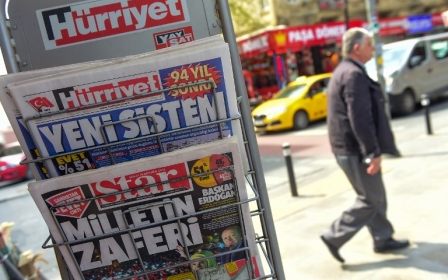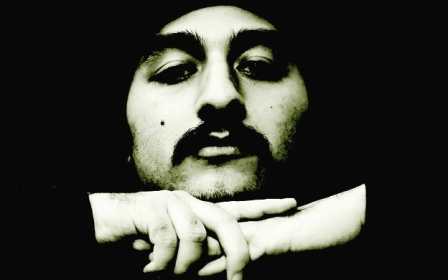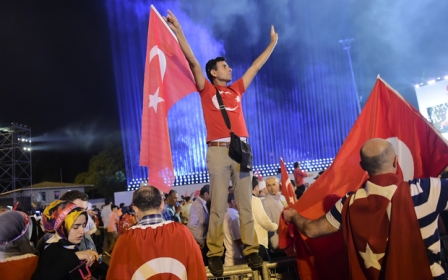Why a new generation of Turkish rappers can no longer 'stay silent'

“If one night they unjustly throw you in jail, you cannot even find a journalist to report about it. They are all locked behind bars.”
Had this been a quote from a statement by a journalistic committee or an opposition political party criticising the imprisonments of journalists in Turkey, it would have gone largely unnoticed.
This is rather a verse from a Turkish rap song titled “#SUSAMAM” ("I can’t stay silent") that became an instant hit across Turkey when it was released on 6 September. It received millions of streams on YouTube and Spotify within the early hours of its release and scored the number one spot in trending topics worldwide on Twitter with more than 300,000 tweets posted.
Important issues
New MEE newsletter: Jerusalem Dispatch
Sign up to get the latest insights and analysis on Israel-Palestine, alongside Turkey Unpacked and other MEE newsletters
Sarp Palaur, a 32-year-old rapper better known with his stage name Saniser, brought together 20 young musicians for a 15-minute-long song, in which each raps about important issues ranging from weakened freedom of expression to erosion of the rule of law, from violence against women to rising nepotism in the workplace.
Also on 6 September, another popular Turkish rapper Ezhel, a 29-year-old whose real name is Omer Sercan Ipekcioglu, dropped a single called “Olay” (Incident) on YouTube with an accompanying video clip, focusing on the devastating incidents the country went through in recent years such as terrorist attacks, killings of journalists and activists, police brutality, the failed coup attempt, and the economic crisis.
The video clip also made it to the trending list on YouTube within hours, albeit for a short period of time, as it was later taken off of the list after being labelled as an “age-restricted video” based on the platform’s community guidelines.
The release of these two rap songs caused a stir in Turkish society and triggered an immediate reaction from the political class
But beneath the surface of their critical verses, these two songs reveal much about two separate but related developments: the rise of the third wave of Turkish rap artists and the growing frustration and rebellion of the country's young generation against the status quo.
The journey to mainstream
Turkish rap was born in the streets of Berlin’s Kreuzberg, also known as “Little Istanbul”, in the mid-1990s. German-born kids of Turkish migrants who moved to the country during the 1960s as guest workers were influenced by hip hop culture and turned to rap, the genre of rebellion and change, to make their voice heard about the discrimination and anti-immigrant sentiments they encountered.
German-born kids of Turkish migrants turned to rap to make their voice heard about the discrimination
Rap quickly started to grow in popularity in Turkey, too, in big part thanks to Cartel, a Germany-based Turkish rap band whose 1995 debut album sold over a million copies.
Rappers like Ceza and Sagopa Kajmer picked up where Cartel left off in the 2000s, growing the genre’s audience further.
Starting in the mid-2010s, but accelerating significantly since 2017, the third wave of Turkish rappers has truly taken over the musical scene of the country. Take a look at the lists of most streamed songs on YouTube and Spotify, turn on the radio, watch the most popular TV series, or just walk past pubs in lively Istanbul neighbourhoods like Kadikoy or Besiktas; their songs are ubiquitous.
A brave new generation
Although highly diverse in their styles and subjects, the third wave of Turkish rappers have one thing in common: they are the representatives of a new generation that only lately has made its presence felt in Turkey.
This is a generation that grew up seeing the same political figures constantly blaming each other for everything that goes wrong in the country as opposed to coming up with solutions. Ranging in age from 15 to 35, this generation is critical of all political sides that have been dividing society over religion, gender, political preferences, or way of life in order to consolidate their power.
At a time when Turkey ranks first in a list of countries where people say they are concerned that openly expressing their views could get them into trouble with the authorities, according to a survey by the Reuters Institute, young rappers emerging from this new generation chose not to stay silent in the face of social, political and environmental crises that have long been plaguing the country.
A national debate
The sharp political lines of the two songs caused controversy almost immediately. Hamza Dag, the deputy head of the ruling AK Party, took to social media on 7 September to denounce “#SUSAMAM” as a provocation and political manipulation. In a short video uploaded to his YouTube account, Dag claimed that the song aims to target the AK Party.
Pro-government newspapers were also quick to criticise the song, with Yeni Safak going as far as to claim it was a joint production by the PKK and FETO - Kurdistan’s Worker’s Party and the Gulen organisation - both designated as terrorist organisations by Turkey.
However as evident in the statement Saniser had to post on Twitter after “#SUSAMAM” stirred a nationwide political debate, blaming everything on the ruling party or siding with the opposition parties wasn’t the young rappers’ motivation.
“Please do not appropriate our song for any political end, do not assume that we’re directly against a particular political stance,” Sanıser tweeted. "We just humbly tried to explain the things that we think go wrong in our country and beyond."
A political earthquake
Indeed, fed up with being constantly marginalised by the country's ruling class, and its mouthpiece in the media, every time they voice criticism, the two rap songs that have created a political earthquake in the country show that the new generation won’t hold back from speaking their minds any more.
According to a 2019 survey by KONDA, an Istanbul-based research company, although this generation is not pious, it has grown more educated, more tolerant, and more hopeful about the future compared to their peers a decade ago.
If the outcomes of 31 March local elections and of the rerun of the Istanbul mayoral election on 23 July have shown anything, it’s that those politicians who turn a blind eye to the frustrations, expectations, needs and hopes of this generation will eventually be removed from the country’s political landscape.
As the lines in “#SUSAMAM” go, if those in charge are “the seat” of a bicycle, this brave and bold new generation is its “wheels and handlebar”.
The views expressed in this article belong to the author and do not necessarily reflect the editorial policy of Middle East Eye.
This article is available in French on Middle East Eye French edition.
Middle East Eye delivers independent and unrivalled coverage and analysis of the Middle East, North Africa and beyond. To learn more about republishing this content and the associated fees, please fill out this form. More about MEE can be found here.



